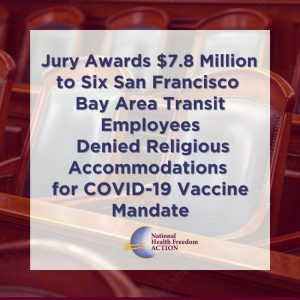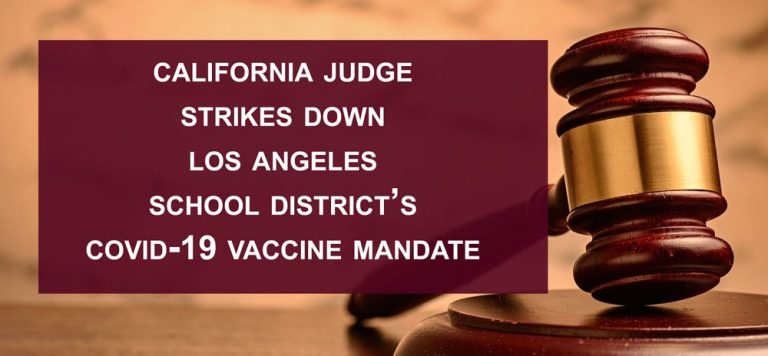Compliance Date Moved from 2022 to 2023
Judge Beckloff noted that the petitioners were not challenging the wisdom of the Resolution at this time; instead, they were challenging the legal right of LAUSD to make vaccine rules that are broader than California state standards. The Resolution was approved on September 9, 2021, by LAUSD’s Board of Education. As noted, it mandates that kids 12 and older be vaccinated against COVID-19 and provide proof thereof in order to be allowed at LAUSD facilities. The District said that the vaccination was, “a mandatory precondition to accessing LAUSD school facilities.” The rule was to go into effect January 10, 2022 but had been put on hold until 2023.
Preemption
The Parent’s first claim is that state law in California preempts the ability of LAUSD to issue its own mandate. Preemption is a legal rule where, for example, a city, county, or school district cannot make rules contrary to a state-wide statutory scheme when the latter is broad and intends to “cover the field” on a particular topic. Noting that school districts in California have, “extremely broad authority” under the state Constitution, the court states that LAUSD had the power to adopt the Resolution so long as, “is not in conflict with or inconsistent with, or preempted by, any law and which is not in conflict with the purposes for which school districts are established.”
COVID-19 Vaccine not on Statutory List
Petitioner Parent G.F. points out that California’s Health and Safety Code imposes vaccine requirements for, “continued enrollment to any public or private elementary or secondary school, childcare center, day nursery, nursery school, family day care home, or developmental center within the state.” The law says that immunization requirements apply at first admission to a school district and at advancement to 7th grade. The statute lists “diphtheria, haemophilus influenzae type b, measles, mumps, pertussis, poliomyelitis, rubella, tetanus, hepatitis Band varicella (collectively, the Ten Vaccines)” as being needed to attend school. COVID-19 is not one of the “Ten.”
When is Local Legislation Forbidden?
Discussing the legal concept of preemption, Judge Beckloff cites authority stating that, “If otherwise valid local legislation conflicts with state law, it is preempted by such law and is void.” To decide is there is a conflict, courts consider if the local law, “duplicates, contradicts, or enters into an area fully occupied by general law, either expressly or by legislative implication.” Local legislation enters into an area fully occupied by state law when the Legislature has expressly or implicitly manifested its intent to fully occupy the area: “Where the Legislature has manifested an intention, expressly or by implication, wholly to occupy the field … municipal power [to regulate in that area] is lost.”
The Ten Required Vaccines Protect Kids
from “Very Real” Health Risks
The state student vaccine law’s purpose is to ensure immunization for “the Ten” listed vaccines as well as any others “deemed appropriate” by the California Department of Public Health (CDPH). The Ten were added to California law via legislative action and after careful consideration of the health risks from these diseases, costs, “communicability, and rates of transmission.” The legislature also made rules for adding immunizations to the Ten. CDPH may add vaccines if they have taken, “into consideration the recommendations of the Advisory Committee on Immunization Practices of the United States Department of Health and Human Services, the American Academy of Pediatrics, and the American Academy of Family Physicians.”
An important aspect of the existing immunization law includes the fact that if or when CDPH adds a vaccine to the list of ten required, any new vaccine requirement is subject to a personal belief exemption. The personal belief exemption does not exist for the Ten already listed vaccines.
Resolution Unlawful Due to Both the Omission of Exemptions
and Preemption by State Law
Preliminarily, Beckloff offers that the Resolution augments, rather than undermines, the state-wide vaccine laws and rules. But the legislature has decided that for vaccines other than the Ten, “there must be personal belief exemption. The Legislature has declared the only vaccines not subject to a personal belief exemption are the Ten Vaccines.” So, the lack of a personal belief exemption in the Resolution is “inimical” to state law. And G.F. argued that the state legislature, “impliedly manifested its intent to fully occupy the area of vaccines required for enrollment and continued attendance in school.”
The judge found that, “the vaccines required of schoolchildren for enrollment and continued attendance in school in this state has been so covered by statutes within the Health and Safety Code that the field has become exclusively a matter of state concern-the Legislature has created a comprehensive scheme concerning schoolchildren and immunizations.” And by giving authority to CDPH to add vaccines, it is implied that such action was not open to local legislation. In closing, Beckloff finds that, “there is a conflict between the Resolution and state law such that the Resolution is preempted and void.” And while LAUSD argued that this court ruling should only apply to the minor, D.F., the judge rejected this point given that the school board lacked the authority to make the Resolution.


